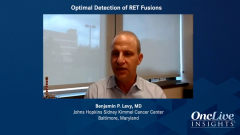
Multikinase TKIs in Medullary Thyroid Cancer
Episodes in this series

Lori J. Wirth, MD: In the US, there are 2 multikinase inhibitors [MKIs] that are already FDA approved for medullary thyroid cancer [MTC], namely vandetanib and cabozantinib. Both these drugs have good activity in MTC. They are both multikinase inhibitors that do inhibit RET as well as VEGFR2 and other kinases. For example, vandetanib also inhibits EGFR whereas cabozantinib also inhibits MET. The response rates with both of the drugs are good, and both were studied in randomized trials compared with placebo and both drugs had improvement in terms of progression-free survival compared with placebo in the studies that were performed.
I don’t know that we know why these MKIs seem to work better in medullary thyroid cancer as compared to other cancers that are driven by RET such as RET fusion non–small cell lung cancer. It may be more related to the tumor type rather than the RET alteration itself, and because we do know that these MKIs or similar MKIs also have activity in iodine-refractory differentiated thyroid cancer when those cancers harbor RET fusions. It probably has something to do with the differences between medullary thyroid cancer and non–small cell lung cancer.
In medullary thyroid cancer with vandetanib we see an overall response rate of 45%, and in terms of the progression-free survival benefit the median progression-free survival had not yet been reached but it was estimated to be 30.5 months with vandetanib compared with 19.3 months with placebo. The vandetanib overall is fairly well-tolerated, but it does cause adverse effects that have to be reckoned with. Fatigue is fairly common. Patients can develop diarrhea, some anorexia and weight loss With vandetanib we also tend to see a lot of photosensitization, patients have to be careful about sun exposure in order to avoid getting a rash. Then, there is an uncommon but potentially significant increase in the QTC interval. Patients starting vandetanib and then on vandetanib do need to have careful EKG monitoring for QTC prolongation.
With cabozantinib the overall response rate in the EXAM trial NCT00704730 in MTC was 28%, and progression-free survival was 11.2 months compared with 4 months with placebo. Now, the progression-free survival differences are different between the cabozantinib trial and the vandetanib trial, but it’s important to note that the vandetanib trial did not require patients to have disease progression at study entry whereas the cabozantinib trial did. They are very different patient populations, it’s difficult to compare PFS benefit to PFS benefit between the 2 studies.
In terms of the adverse effect profile with cabozantinib, it’s similar to the other multikinase inhibitors that target RET as well as VEGFR2. You do see, again, fatigue, diarrhea, anorexia. Hypertension is also seen more commonly with cabozantinib as well One of the markers of the toxicity profile with cabozantinib and vandetanib is the frequency in both of the studies of dose holds and dose reductions, which were not insignificant in both trials, as well as even dose discontinuation due to the adverse effect profile, which occurred in more than 10% of patients, in both studies.
Transcript Edited for Clarity



















































